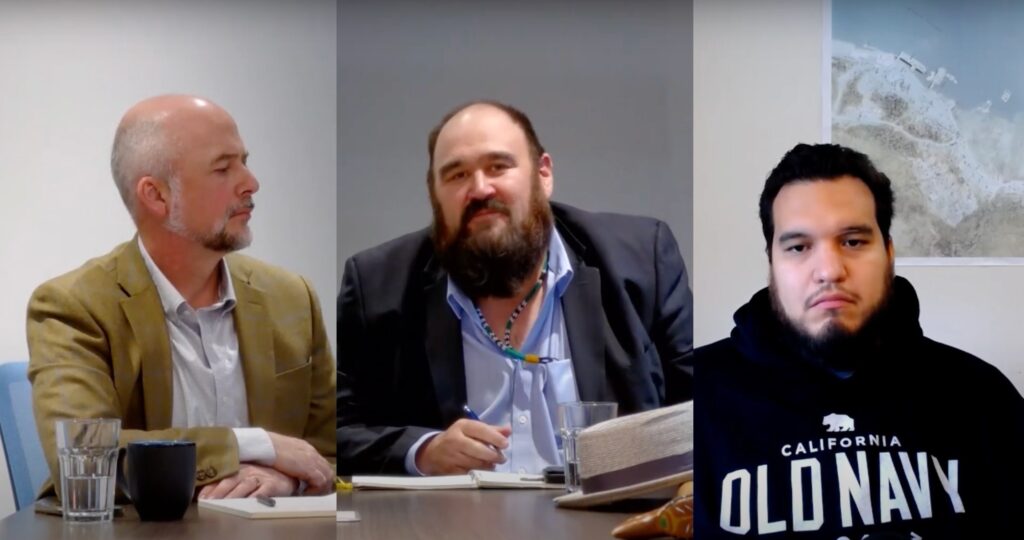
Features
First Nations leaders challenge UBCIC’s stance on B.C. salmon farms
Dallas Smith and Isaiah Robinson criticize the group during a recent podcast episode of Rez Dog Walker
December 27, 2024 By Aquaculture North America staff
 Tim Kennedy, president and CEO CAIA, Dallas Smith, president of Nanwakolas Council and Isaiah Robinson, Deputy Chief Councillor to Kitasoo Xai'xais Nation. (Photo: YouTube Screenshot)
Tim Kennedy, president and CEO CAIA, Dallas Smith, president of Nanwakolas Council and Isaiah Robinson, Deputy Chief Councillor to Kitasoo Xai'xais Nation. (Photo: YouTube Screenshot) Some First Nations groups who are dependent on salmon farming are saying the Union of British Columbia Indian Chiefs (UBCIC) are acting like “colonial masters” over salmon farms in their territories.
The UBCIC is supportive of the government’s plan to end net-pen salmon farming in B.C.
“It’s bizarre that this is how the UBCIC would like to operate in general. And they well know that this isn’t the right way to handle this. And most chiefs, I would say, understand that this is not the right way to operate and trying to govern other people’s territories because we’re not going around telling everyone else what to do within their own territory,” said Isaiah Robinson, Deputy Chief Councillor to Kitasoo Xai’xais Nation in the latest episode of his podcast, Rez Dog Walker.
Host Dallas Smith spoke with Robinson and Tim Kennedy, president and CEO of the Canadian Aquaculture Industry Alliance, about the ongoing challenges surrounding salmon aquaculture in British Columbia and the net-pen salmon farms in the province.
Smith said a nation versus nation issue sprung up. It wasn’t until 19 farms got taken out of their territories that the others realized that it could happen to them, too.
“As we’ve started to tour around and talk to other nations, nation to nation, we realized that the level of information hasn’t flowed properly…when the issue got contentious, a lot of us just stuck to our knitting and stayed in our communities,” Smith said.
On the podcast episode, they discussed the effects of the federal government’s decisions to ban net-pen farming in B.C., the role of Indigenous communities, and the need for balanced dialogue in ocean management.
Robinson admits that in the past, there were people in the aquaculture industry who didn’t care much for the environment but wanted to make money but that has changed in the past 20-30 years.
Although there’s a new era, with the industry caring about what’s coming out and how companies are managing their operations, it’s already been tainted. “Even if we’re doing our due diligence and justifying and showing it, it puts us in a bit of a harder situation to kind of create, to educate people on the balance,” Robinson said. “So it’s an interesting kind of dynamic we’re having to face.”
Robinson said the industry was at a good place just before the ban on fish farms was announced. “We had everything kind of lined up in regards to what we wanted for transition, what we wanted our partners to do, and now everything seized up because shareholders aren’t able to invest as much as they want,” he added.
According to Kennedy, it doesn’t make sense to him how an industry, which was considered an essential service only a few years ago during the COVID-19 pandemic, is going to be shut down.
“When you say something is going to be shut down, but there is no realistic way of actually building replacement industry in its stead, what happens is, as Isaiah said, all that capital that could go into building a new sector and into and being invested in new capital is frozen and doesn’t flow,” Kennedy added.
“This is a bad policy, but worse politics,” said Kennedy. “I would say there has been a massive separation on this issue between the politics and the bureaucracy.”
Aquaculture has some benefits for First Nations including the ability to partly finance the building of 100 houses over the next five years in Smith’s nation. “But we just keep dying by the death of 100 cuts on these issues, to a point where I’m in Ottawa right now going to beg the Housing Minister for money to build houses that I was prepared to build on my own,” he said.
Even if all the myths around the impacts of farmed salmon on wild salmon were debunked, the ability to do land-based aquaculture in B.C is “just a fairy tale,” Smith said. “As much as I hope the technology eventually gets to a place like that. It doesn’t exist right now.”
Kennedy believes the weight of the decision-making needs to be taken to the local level and communities. He said there needs to be a pushback on the activists across the country who are constantly demanding greater transparency and greater accountability on the part of the industry, but not accepting accountability for a lot of the misinformation that is being put out to the public.
He emphasized the importance of education moving forward. To break the polarization, he said it’s important to identify those who are willing to work with the industry to see improvements while respecting the rights and recognizing the good things happening in the communities.